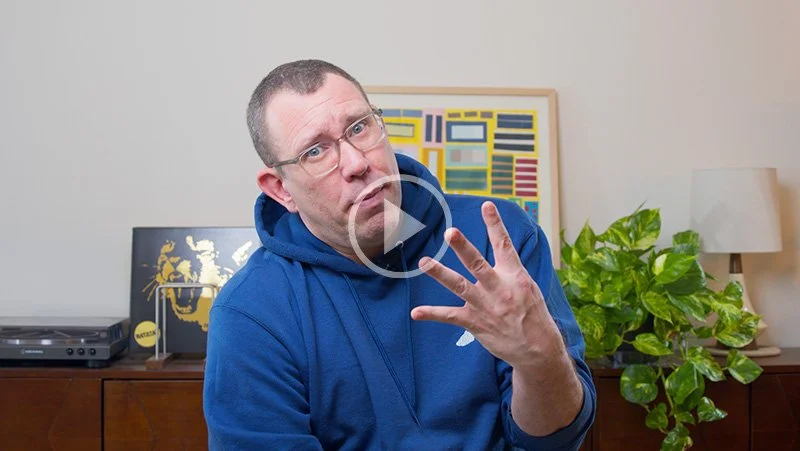4 Must-Haves to Build a Culture of Feedback
Welcome to the #culturedrop (previously the #shiftyestribe). Every Tuesday, Galen Emanuele emails tools to advance leadership skills, team culture, and personal growth. No spam, just great content. Sign up now to get it in your inbox.
In this video, we introduce April’s #shiftyestribe focus - feedback. More specifically, how to build a culture of feedback.
This one is huge. Feedback done well within organizations is imperative to building trust, growth, and accelerating improvement. However, when handled poorly it’s damaging, destroys trust on teams, and skyrockets turnover. It’s appropriate that we’re jumping into this on the heels of last month’s focus, productive conflict. The ability to effectively give and receive feedback also goes a long way to reducing unnecessary conflict within teams.
Feedback is definitely a hot button topic, and there is a lot to unpack. Before diving into the fine details of how to give and receive it, the conversation needs to begin by talking about what it takes to build a culture of feedback, where feedback is not seen as criticism but an opportunity to coach and improve. Teams have to establish an environment that is conducive and receptive to feedback, where it’s seen as productive, safe, welcome, and sought after. And this doesn’t happen overnight. There’s no way to snap your fingers and say, “Here we are! We have a culture of feedback now.” It takes a collective shift in mindset of your relationship with feedback as well as gaining specific, tactical skills to gather and deliver it effectively. To first tackle the process of shifting mindsets, here are four critical elements required to build a culture of feedback:
1. Perfect is garbage.
“There is an absolute truth about this topic and that is that feedback requires vulnerability. ”
To have a culture of feedback, we have to recognize and admit collectively that none of us are perfect. Not only that, but we have no interest in projecting an appearance of being perfect, all-knowing, flawless humans who have everything figured out and never need help - because that’s 100% garbage. We replace all that with a fierce commitment to constantly improve and to always do our best, individually and for each other.
Ingredients required: one part embracing reality, one part courage, two parts vulnerability.
2. Develop common language around feedback
“In order to build your capacity as a team, you have to use common, familiar language for the benefit of investing in each other and your shared success together.”
Developing this cultural norm takes time and practice that will likely feel clunky at first, especially if feedback isn’t already a big part of your team’s fabric. It’s helpful to create a common, familiar structure for feedback so that the process and language is consistent across the team. This will fast track everyone’s capacity to improve at (and eventually master) gathering and delivering it.
3. Feedback goes up, too
“It is so important to go to your people and ask, ‘How am I showing up as a leader?’”
One of the biggest mistakes that companies make is structuring feedback to only go ‘downward’ in an organization from leaders to the people they lead. This is dangerous and frankly, incredibly stupid. Give your employees the opportunity to share feedback about leadership and the organization, or you will lose them. Prove that you care and are invested in your people by digging into how their experience can be improved. Leaders need to actively seek input and be receptive to learning how they can better serve their teams. There is no better way to build trust and loyalty from your team as a leader than to ask, listen, and make changes based on their feedback.
4. External feedback is your fast-track to growth
“For feedback to be effective, we have to be willing to hear things that are hard to hear.”
The other thing you have to wrap your mind around is that external feedback will get you to where you want to be a million times faster than if you assume how you’re showing up in your role and impacting people around you. It’s a requirement for personal and professional growth. It must be sought out, welcome, and seen as way to highlight your blindspots and opportunities to improve. You have to have the courage to hear the things that are hard to hear, you won’t discover them all on your own.
Giving and receiving feedback is a challenging dynamic to address and difficult to master. Start with building the right mindsets around a culture of feedback and then taking one (sometimes clumsy) step forward at a time. It requires a dedicated level-up of your willingness and capacity as a team to communicate well and approach feedback in service of individual and shared growth. When teams get great at feedback, you’ll find employees who are more engaged, connected, developing faster, and more invested in each other’s success.
This article was created by Galen Emanuele for the #culturedrop (previously the #shiftyestribe). Free leadership and team culture content in less than 5 minutes a week. Check out the rest of this month's content and subscribe to the Culture Drop at https://bit.ly/culturedrop






